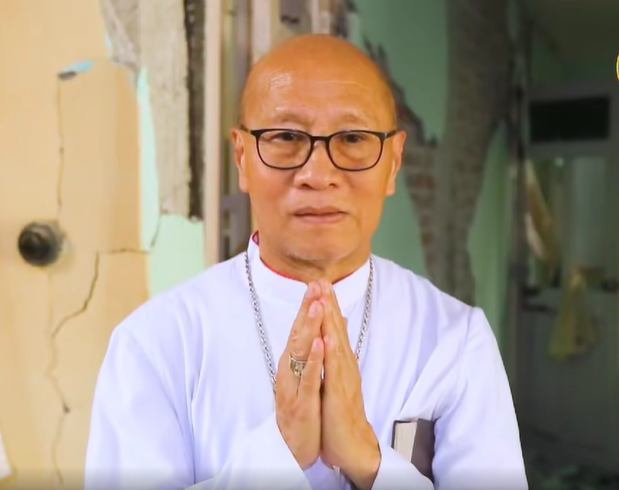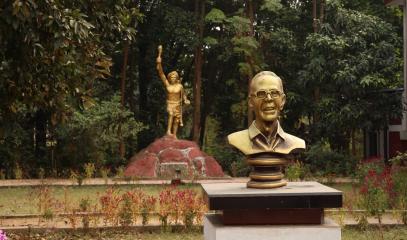Father Stan’s legacy: the dream of justice for the Adivasis continues in Ranchi
Four years after the death of the Jesuit who dedicated his life to defending the land rights of India’s indigenous peoples, the Bagaicha centre, which he founded in the State of Jharkhand, continues to fight for the poor. Despite threats and continuous mining, Jesuits and activists continue their mission to accompany tribal communities in claiming their rights, in the name of Father Stan Swamy, a symbol of justice for new generations too.
Ranchi (AsiaNews) – Four years ago, the picture of Father Stan Swamy was added to the long row of framed images that adorn the walls of one of the main corridors of the Bagaicha Centre in Ranchi, the capital of Jharkhand, one of the Indian states with the largest tribal population. At the end of the same corridor there is still his room, a spartan room occupied by a bed, a desk, and a wardrobe.
“I was there when Father Stan was arrested,” says Father P.M. Tony, the new director of the facility, created, in the words of its founder, for "all those who are interested in issues that affect marginalised people."
Detained on phoney charges in a Mumbai jail, despite his 84 years of age and a diagnosis of Parkinson's, Stanislaus Lourduswamy – this is his full name – died on 5 July 2021 after contracting COVID-19. In reality, the Indian government killed him.
Originally from Tamil Nadu, southern India, he studied sociology and headed for more than ten years the Indian Social Institute in Bengaluru, a Jesuit-run research and training centre for marginalised people.
In the second half of the 1980s, he moved to live with the Adivasis, the indigenous people of India. In the name of ever-new development projects, they are still being robbed of their land and resources found underground.
Taking inspiration from the Jesuit experience in Latin America, Father Stan saw reality by recognising in liberation theology a way to fight for the rights of the last.
In 2000, after the creation by the Indian government of the State of Jharkhand (which holds 40 per cent of the mineral wealth of the entire country), the Jesuit moved to Ranchi where he set up the Bagaicha Social Research Centre.
In true Adivasi style and in the local language, the word "bagaicha" indicates a clearing inside the forest that is home to all types of plants and where members of indigenous communities gather to make decisions. A sort of "agora" of the woods.
In the middle of the garden, there is also a slab of rock on which the names of those who gave their lives for the tribal cause have been carved, including, lastly, that of Father Stan.
The latter “used to close his eyes in prayer in front of this stele every morning for five minutes", said Father Tony.
According to the tradition of the Munda people who erect funerary stone monuments called "pathalgadi" at the entrance to their villages, the souls of the martyrs remain in this world in the form of spirits. In rural areas, Christian tribals and followers of Sarnism, an animist religion, live side by side.
Father Stan was arrested on 8 October 2020, on charges of collaborating with Maoist militias. However, as the investigation revealed, the files found on his computer, which led to his imprisonment, had been inserted by an unknown hacker.
His work is now carried out by four Jesuits and a nun. “There is a lot to do, and the issues that Father Stan dealt with have got worse," Father Tony noted.
Indian law provides that large mining companies can take over Adivasi lands if they have obtained the approval of local tribal councils. But in most cases tribal communities do not know that if they decide to give up their land they are entitled to fair remuneration, so they often accept figures from mining companies that are far lower than what is provided for by law.
“Until about ten years ago, there were many more educated people,” explained the Jesuit clergyman, who hails originally from Kerala, but then the Bharatiya Janata Party (Prime Minister Narendra Modi’s ultranationalist Hindu party) shut down hundreds of schools in Jharkhand saying that there were not enough students, thus forcing locals to go to private schools, which many families cannot afford.”
Educating Adivasis today is partly done by Sister Leena, a member of the congregation of the Sisters of Charity of Jesus and Mary, who translates into the local language the documentation that is delivered in Bagaicha to tribal communities, whose members are often illiterate.
“We try to create informal schools, educating people about their rights, and we support them in their choices against big companies. But when we visit the villages we realise that the population lacks everything, medicines for example,” said the nun, who joined the work team at the Ranchi centre about a year ago.
“The government is not even building irrigation systems, in order to push people to leave. Due to climate change, crops are increasingly less productive,” explains Father Tony.
“Forced to abandon their lands, tribals end up becoming day labourers in the mines, often without safety measures, while young people emigrate to other Indian states.”
Precisely because of their low level of education, they find themselves prey to other exploitative companies, an issue that Father Sebastian Larka, also a Jesuit, researcher and activist, deals with at the Bagaicha centre.
“Young people move to the South, to Tamil Nadu, to Kerala. They work in construction and road building. But they reach their destination thanks to intermediaries,” explained the priest.
In addition to raising awareness among Adivasis about these issues to promote safe and legal migration, the Jesuits in Ranchi hold seminars for students, activists, researchers and lawyers.
“Every day, thanks to a network of contacts on both sides of the migratory movement, we try to solve the problems of tribal workers, first of all, the non-payment of salaries. But also accidents at work, problems with the police, and the increase in suicides,” Father Sebastian said.
In addition to raising awareness among Adivasis about these issues to promote safe and legal migration, the Jesuits in Ranchi hold several seminars for students, activists, researchers and lawyers.
“But today we are under watch, we cannot do everything we used to do," the priest added. "The local investigation office asks a lot of questions, especially when we organise training events."
Yet students, activists and volunteers frequently visit the centre founded by Father Stan. This is the case, for example, of Deepti Mary Minj, a young Catholic and an ethnic Oraon political who is a political ecology researcher who supports the work of the Jesuits and manages the Bagaicha centre’s social media.
“It is hard not to be demoralised by the situation," she said after returning from a visit to Dumka District, where new mines have recently sprung up and alcoholism among tribals has increased. In fact, it is only thanks to rice distillates that many are able to work in the coal fields without safety measures.
“What gives me the strength to continue is the sense of justice. It is often a lonely fight, but if the goal is the truth, sooner or later it comes out." And it shows a reality that is the other side of the India propagated by Narendra Modi, where, in the name of the country's development, various forms of abuse against the weakest groups of society are swept under the carpet.
"Father Stan used to say: ‘I will not be a silent spectator’,” added Deepti, who considers the Jesuit her source of inspiration. “As long as the fight for justice continues, Father Stan lives.”
07/07/2021 15:18
12/10/2020 16:13
15/11/2021 15:39









.png)










